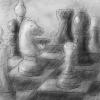You have a really cynical view of artists though.
In case it wasn't obvious, I posted the image as a comment on your 'ideas guy as an artist' stance, rather than a comment on artists in general.
As for the 'real meaning' of the image, (which was created by an artist, presumably) that, like all art, is open to interpretation.
On the subject of artists, have you ever watched an artist at work? Because they don't always get things right first time. They prototype, iterate etc. just like developers.
I did mean an ideas guy who is also the lead game designer, I don't see why he shouldn't be considered an artist.
Yes, artist don't always get it right on the first try, but they try to get it right without getting too distracted from what they were originally trying to convey.
As for a game designer having to eb able to collaborate, of course that's an important skill. But if you as a programmer suggest a game mechanic and he doesn't see howm it fits in his design, why would it be a bad thing if he doesn't want to change it? There's a difference between being a diva and knowing what you want your game to be.
Nobody is suggesting this. A critical skill for a lead game designer is knowing which ideas and changes to incorporate and which to leave out, and when to remove ideas that sounded good but that aren't working out.
The main thing we are suggesting is that the lead game designer must be willing and able to apply the same process equally to their own ideas and those of others.
Game design doesn't have to be a democracy, and it probably shouldn't be. A benevolent dictator will work fine.
I fully agree with you there, the only thing we have slightly different opinions on is to which extent a game designer should deviate from his original idea to optimize it.
And to which degree his original idea is worth anything. (I do think it's only worth anything in the hands of a capable and passionate designer with the possibility of actually making it.)









